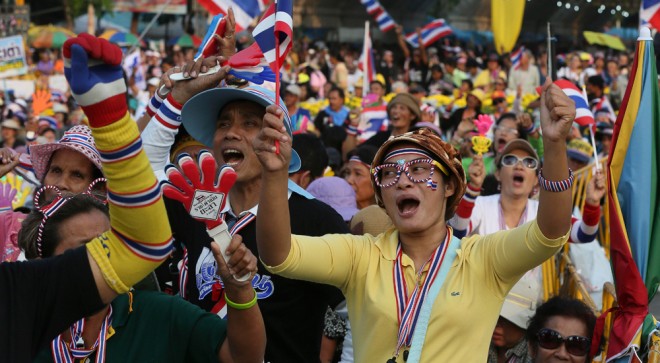Thai capital braces for protests

Anti-government protesters shout slogans at the Democracy Monument in Bangkok, Thailand, Sunday, Dec. 8, 2013. The main opposition Democrat Party resigned from parliament on Sunday to protest what it called “the illegitimacy” of a government with which it can no longer work. The move deepens the country’s latest political crisis one day before new street demonstrations that many fear could turn violent. AP
BANGKOK – Thailand’s capital braced for another wave of unrest Monday as protesters trying to overthrow the country’s democratically elected government vowed to swarm Bangkok’s streets for a “final showdown.” The demonstrations come one day after the main opposition party resigned from Parliament en masse, exacerbating the nation’s deep political divide.
Protest leader Suthep Thaugsuban called on supporters to stay peaceful, but many fear the day could end violently when demonstrators converge from nine locations on Yingluck’s office at Government House. More than 60 Thai and international schools in Bangkok have closed as a precaution.
Thailand has been plagued by political turmoil since the army toppled Prime Minister Yingluck Shinawatra’s brother Thaksin in a 2006 coup. In broad terms, the conflict pits the Thai elite and the educated middle-class against Thaksin’s power base in the countryside, which benefited from populist policies designed to win over the rural poor.
“We will rise up. We will walk on every street in the country. We will not be going home again,” said Suthep, whose supporters have occupied the Finance Ministry and part of a vast government complex for more than a week. “The people who will be going home empty-handed are those in the Thaksin regime.”
Despite calls for calm, a group of hooded and masked men crept in the dark Sunday night toward a police post at Government House and attacked it with slingshots loaded with nails and sharp metal projectiles, according to Police Maj. Gen. Piya Uthayo. Police did not respond, and the assailants retreated, he said. There were no injuries.
Article continues after this advertisementSince the latest unrest began last month, at least five people have been killed and at least 289 injured. Violence ended suddenly last week as both sides paused to celebrate the birthday of the nation’s revered king, who turned 86 Thursday.
Article continues after this advertisementThe crisis boiled over after Yingluck’s ruling party tried to ram through a controversial amnesty bill through the legislature. Critics say it was designed mainly to bring back Thaksin, who lives in self-imposed exile in Dubai to avoid jail time for a corruption conviction he says was politically motivated.
Abhisit Vejjajiva, the leader of the Democrat party and a former premier, said Yingluck’s government had become “illegitimate” since then, and his party had no choice but to pull out of the lower house.
The Democrats held 153 of the 500 seats in the legislative body, according to the latest figures on their website. Abhisit said the resignations were effective immediately.
“The solution to our current problems needs to start with the showing of responsibility,” Abhisit said. “The prime minister has never showed any responsibility or conscience.”
Democrat spokesman Chavanond Intarakomalyasut told The Associated Press that the legislature was “no longer accepted by the people.”
The minority Democrats — who are closely allied with the protesters — have not won an election since 1992, and some of their leaders appear to have given up on electoral politics as a result. The protesters are demanding a non-elected people’s council lead the country instead.
Yingluck’s embattled government, by contrast, came to power in a landslide vote in 2011 that observers said was free and fair.
In a speech Sunday, Yingluck said again that she was not trying to cling to power and would be “happy to resign” and dissolve Parliament if that could ease the crisis. But she said those things could only happen if new elections are organized within 60 days and all parties accept the outcome.
Suthep has repeatedly rejected those initiatives and refused to negotiate.
Yingluck also reiterated an offer to set up a national forum to find a way out of the crisis. She said if there was still no resolution, a national referendum could be held, but she did not specify on what.
Any “government that comes to power without elections would significantly affect our image and confidence in the country,” Yingluck said, referring to Suthep’s demand for a specially appointed “People’s Council” to rule.
Related Stories:
Thai opposition protesters prepare for ‘final showdown’
Thai crisis deepens as opposition quits Parliament